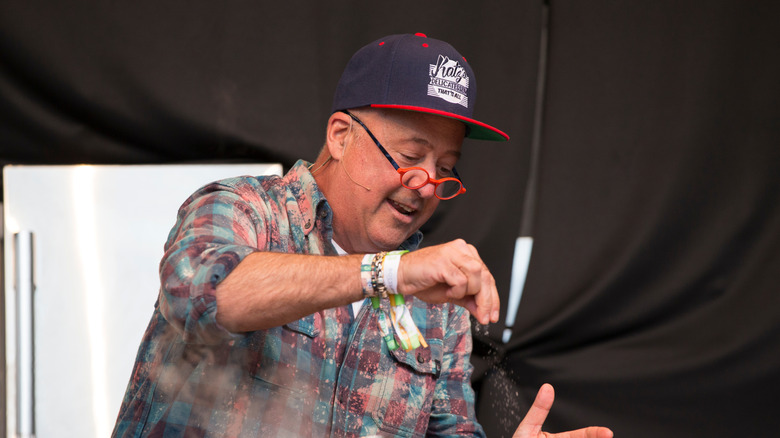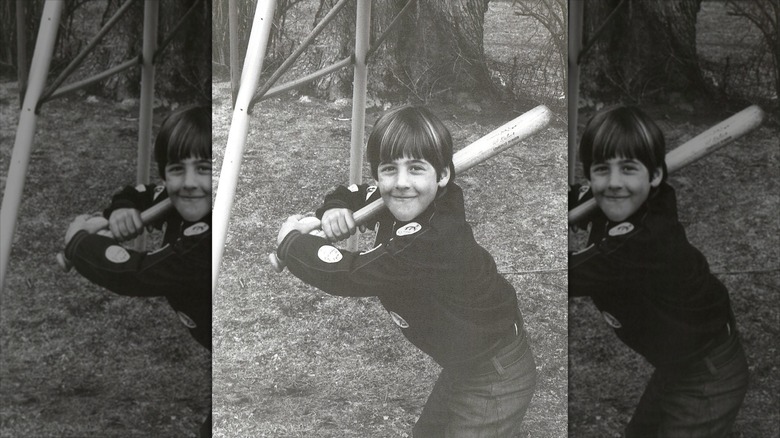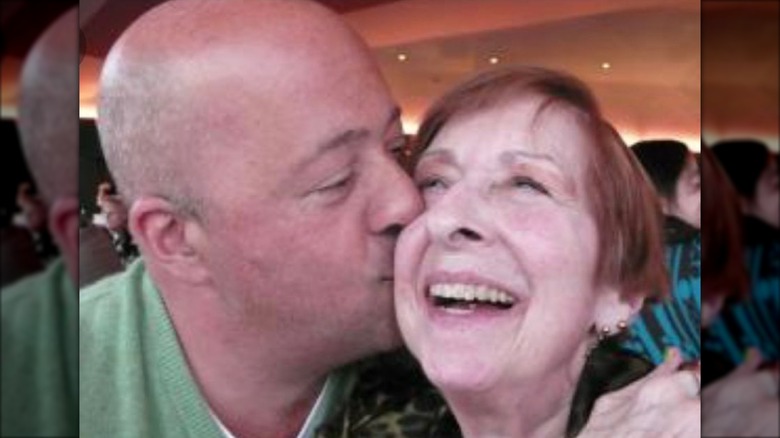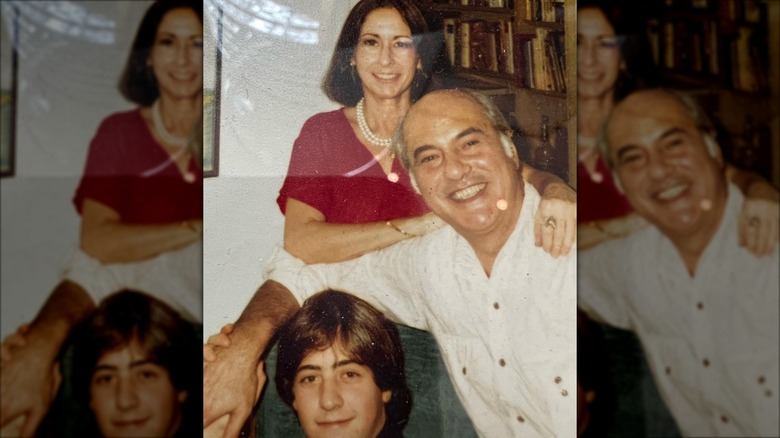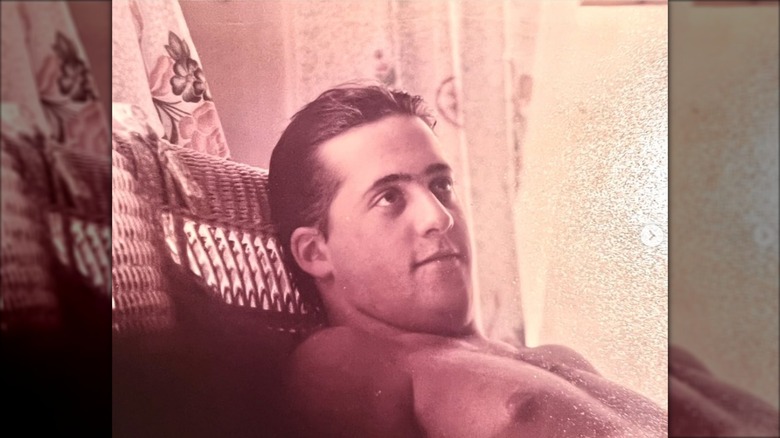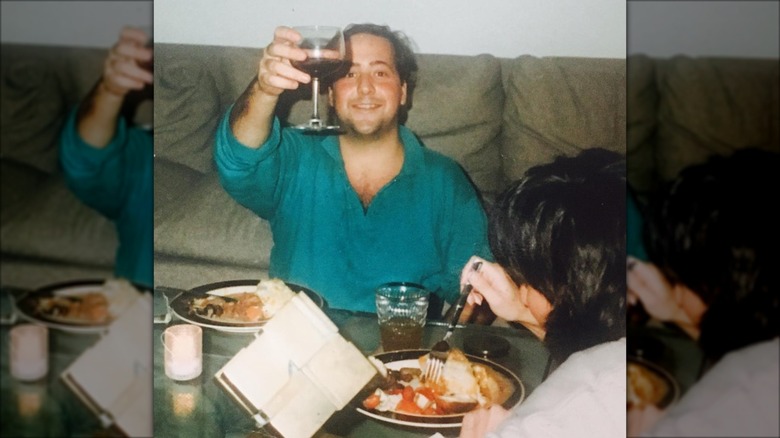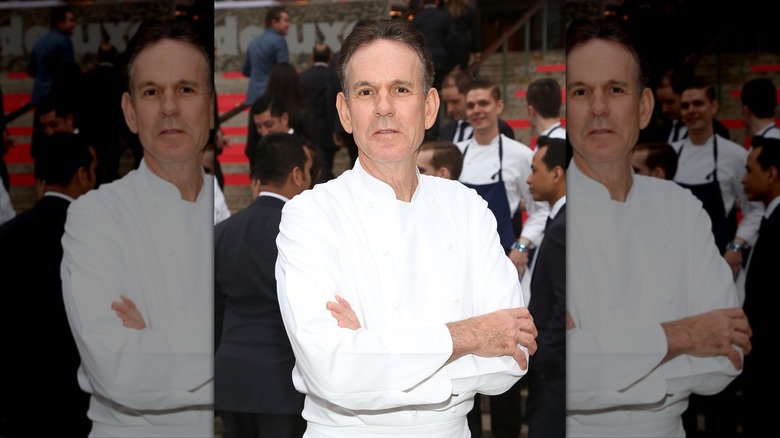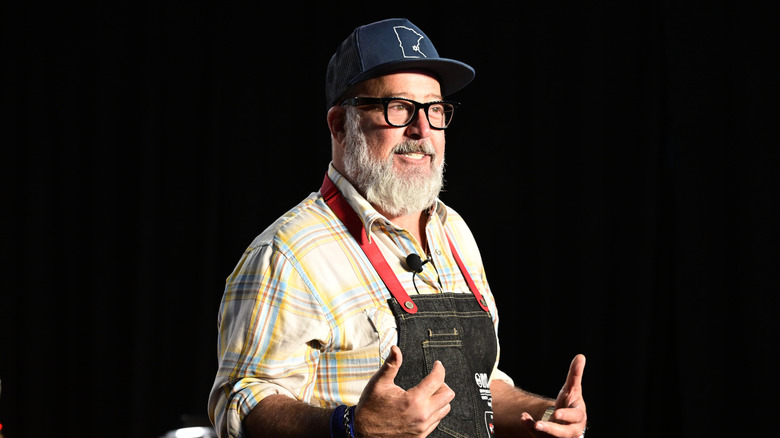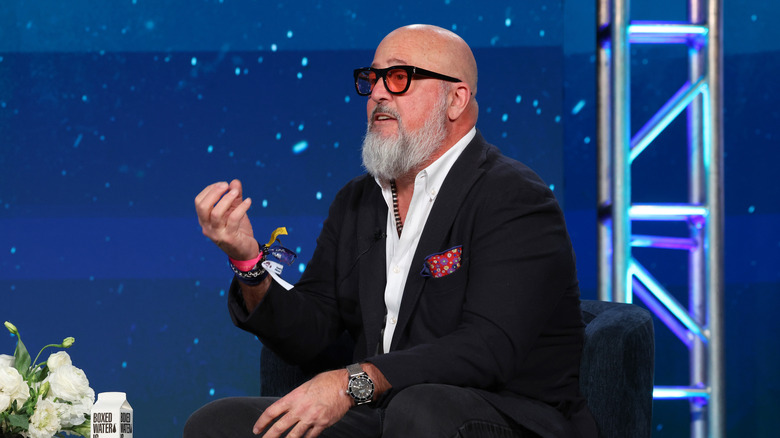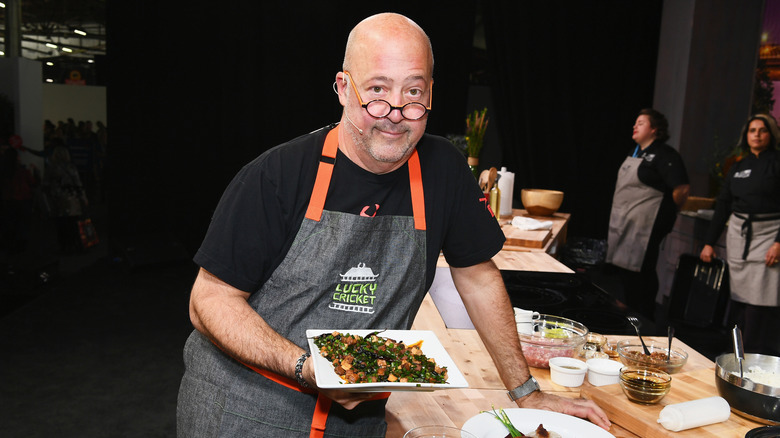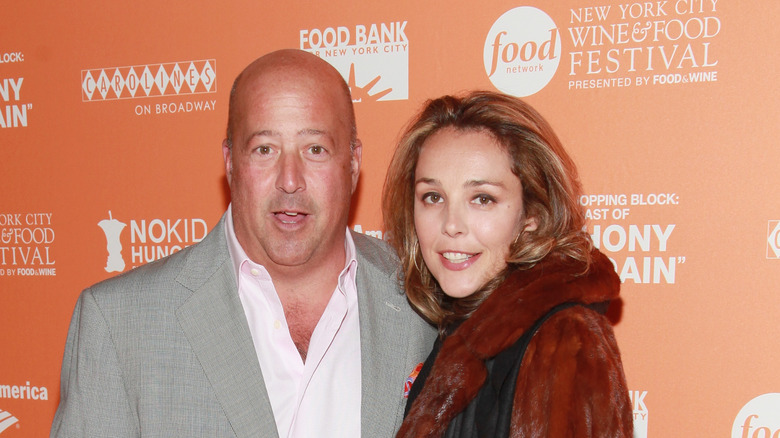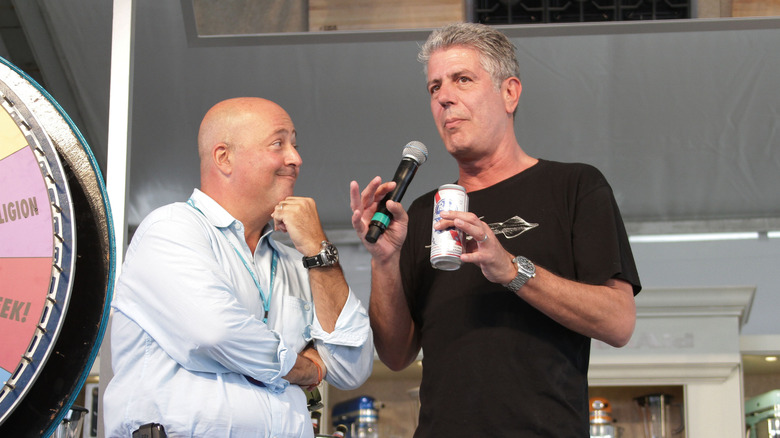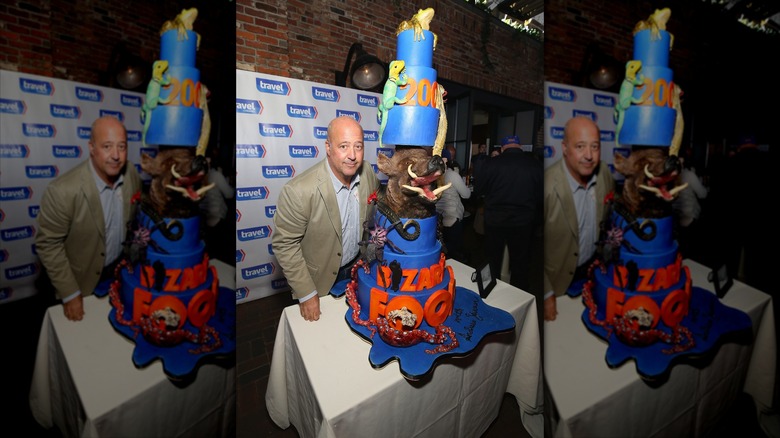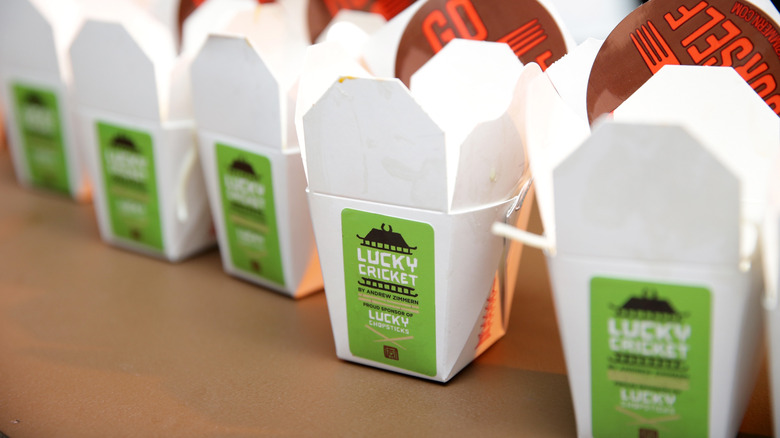The Tragic Real-Life Story Of Andrew Zimmern
Thanks to creating and subsequently hosting the hit TV show "Bizarre Foods" for 13 years, Andrew Zimmern, a man who has eaten and enjoyed a huge range of foods, is one of the most well-known celebrities in all of food media. Since the show went off air, his star has continued to rise. Zimmern has created and starred in various other TV shows, including "What's Eating America," and has authored several books. He's known for being a philanthropist and regularly works with charities and organizations to address global hunger, addiction, and homelessness. By these metrics, he is an incredibly successful person.
The problem with listing a person's achievements is that it removes all context. Read the above and you'd assume that Zimmern's life consisted of him skipping happily from one major milestone to the next. Of course, the reality is far different; Zimmern's life and route to stardom have been anything but straightforward, with his tragic story encompassing addiction, homelessness, and the collapse of a burgeoning restaurant concept.
Zimmern's parents divorced when he was young
To better understand what happened later in Andrew Zimmern's life, it's important to first examine his childhood. By his own reckoning, Zimmern did not want for much as a child. He was born into a privileged family in New York and materially had anything he could wish for. However, it wasn't all sunshine and rainbows. He was a child when his parents divorced. While they remained friends, the experience was difficult for the young Zimmern. What's more, he also struggled with anxiety from a young age and remembers how difficult it was for him to fit in.
After the divorce, Zimmern's father moved to New York's West Village with his partner, Andre, where they developed a friendship with American food luminary James Beard. Zimmern recalled how happy it made him to see his father and step-father relax in this safe space. However, these experiences were relatively few, and Zimmern spent the majority of his time with his mother, Caren.
His mother became seriously ill
In 1974, Andrew Zimmern returned from summer camp to learn that his mother was seriously ill. During surgery, Caren had been given the wrong anesthesia. This led to her brain being starved of oxygen. She subsequently suffered severe brain damage. Speaking to CPR News, he said, "It was the most traumatic day of my life, without a doubt. We went up to the hospital room and I walked in. I saw her in an oxygen tent [...] I just broke down hysterically."
Further compounding this trauma was his father's decision to return to his home in the West Village while Zimmern lived in his mother's place alone but for a nanny and housekeeper. Left to his own devices, Zimmern began experimenting with drugs and alcohol, first by helping himself to his mother's fully stocked bar and then through purchasing and smoking cannabis. Zimmern quickly realized that drugs and alcohol were an effective coping mechanism, and by 10th grade, he was smoking, drinking, and taking pills on a daily basis.
Andrew Zimmern took drugs as a child
Andrew Zimmern's drinking had its roots in childhood when he got a taste for scotch. He used to sip the drinks he made for his parents, enjoying the thrill of deception as much as the alcohol itself. Soon, Zimmern was having drinks of his own.
During the summer his mother became ill, Zimmern's drinking was complemented with cannabis consumption. Struggling to deal with the grief associated with her illness, Zimmern even turned to drug dealing, using family money to purchase cannabis before selling a portion of it on to his friends at 13 years old.
By the time Zimmern was in junior year of high school, he started taking cocaine, and in his senior year, Zimmern even took heroin. Despite his serious drug and alcohol habit, Zimmern managed to graduate from The Dalton School, a member of the Ivy Preparatory School League, and set his eyes on college. He was accepted into Vassar, where he majored in history.
His drug taking progressed at a scary pace
During college, Andrew Zimmern's drug habit got even worse. At this time, he was using a range of stimulants, sedatives, opioids, and other drugs, frequently in conjunction with one another. While incredibly detrimental to his physical and mental wellbeing, taking drugs in this way allowed Zimmern to function at a high level.
Throughout all of his drug taking endeavors, Zimmern continued to drink heavily. In fact, during his freshman year, Zimmern was admitted to hospital with alcohol poisoning. It was after this fiasco that a counselor told Zimmern he was an addict. Brushing off the counselor's concerns, Zimmern continued to abuse his body throughout his time at Vassar.
The college suspended him on three separate occasions. During these months, Zimmern worked in kitchens across Europe, developing his culinary knowledge. He also learned that many people in the culinary industry were able to find work despite their problems with addiction. Zimmern finally graduated college after seven long years. Once he did, his eyes were firmly set on a career in restaurants.
He began to lose control of himself
While Andrew Zimmern's drinking and drug use had always been problematic, he only realized he had a problem after leaving college. It was during this time that friends began to question his behavior. Zimmern explained to Artful Living, "I would get calls the next day and instead of hearing things like, 'Oh my God, we got so drunk. You were so hysterical,' it was, 'Dude, that was really awful. That really scared me. I've never seen you that aggressive or violent before.'"
Soon, Zimmern was staying in bars until the early hours of the morning, long after the friends he'd been drinking with had gone home. At this stage of his life, Zimmern not only accepted that he was a drug addict and alcoholic but pushed away anyone who tried to help him.
Despite his worsening addictions, Zimmern enjoyed great success in the early part of his culinary career and worked in fine-dining establishments run by notable chefs, such as Anne Rosenzweig, Joachim Splichal, and Thomas Keller. In these settings, Zimmern gained a reputation for being competitive and was able to churn out vast volumes of high-quality food at a fast pace.
Zimmern's early career was ruined by drugs
Andrew Zimmern's stint as a promising, high-flying chef was soon brought to a halt as his addictions caught up with him. Soon, he was losing one job after another. More often than not, the reason he was fired was highly embarrassing. In one instance, while working at Thomas Keller's Rakel, Keller found Zimmern passed out in the liquor cupboard, still drunk from the night before. He also lost jobs at Anne Rosenzweig's Arcadia, Joachim Splichal's QV, and La Colona.
While a liability outside of work, Zimmern was known as a guy who worked quickly and effectively inside professional kitchens. He was a master at pushing out notoriously tricky-to-make dishes, such as risotto, in huge quantities with no discernible drop in quality. This meant that, despite his constant mishaps, Zimmern did not struggle to find new jobs during the early portion of his career.
Eventually, Zimmern's ability to work effectively waned as he fell ever deeper into heroin addiction. Soon, no restaurant would take him, risotto-making skills or not. While this spurred him on to quit drugs, Zimmern leaned ever more heavily on alcohol.
He was homeless for 11 months
Unable to keep a job, Andrew Zimmern was evicted from his apartment at the end of 1990. He would be homeless for 11 months. To survive this period and support his alcohol addiction, Zimmern resorted to theft, stealing handbags from restaurant patrons, pocketing any cash, and selling stolen credit cards and passports.
Zimmern squatted, along with several other homeless people, in an abandoned building on Sullivan Street in New York City. During this time, he did not shower or have a bed. The building was infested with rodents and cockroaches, and Zimmern has vivid memories of pouring Comet cleanser around the dirty clothes he slept on in order to prevent the animals from crawling over him. Perhaps most startling of all is that Zimmern convinced himself this was a perfectly reasonable way to live. As a result of living this way, Zimmern lost contact with just about all of his friends and family. He was alone and unable to face his alcoholism.
Zimmern attempted suicide
After 11 months of homelessness, Andrew Zimmern's physical strength was failing him. He was sick. As his circumstances were not improving, he made a drastic decision: He was going to commit suicide. Zimmern broke into his godparents home and stole some jewelry, which he sold. With this money, he bought multiple cases ofvodka, checked into a hotel, and set about drinking himself to death.
Days of drinking passed, but when Zimmern finally came to, something miraculous had happened. As he explained to Artful Living, "I woke up one morning and the tension, the Ace bandage that had been tied so tightly around my entire life just wasn't there. I felt a desperate need to reach out to someone. I called my friend Clark [...] He came down and got me out of there."
Clark put Zimmern up in his own home during the few days it took for him to arrange an intervention. On January 28, 1992, Zimmern went to a friend's family restaurant where 20 of his closest friends told him he had a problem. They gave him a one-way ticket to a rehab facility in Minnesota and sent him on his way.
He went to rehab and rebuilt his career
Andrew Zimmern threw himself into the five-week program at the Hazelden Betty Ford Foundation, taking part in one-on-one sessions, group talks, and guest speeches. At the end of this time, he moved into a halfway house where he was told he had to get a job. Zimmern ended up as a dishwasher, an overlooked and vital role in every professional kitchen. He worked at a diner called Dubin's and then at Café Un Deux Trois.
Using his prestigious culinary talents, Zimmern soon rose up the ranks to become Café Un Deux Trois' executive chef, and the restaurant garnered rave reviews during his time there. During his later years at the restaurant, Zimmern started taking media jobs, both radio and TV, as part of a multiyear plan to get his own television show.
During this time, he pitched the Food Network on multiple shows. He eventually hit the jackpot with "Bizarre Foods," a show that featured Zimmern traveling all over the globe to try niche foods. The show was a huge hit and led to Zimmern winning multiple James Beard Awards.
His marriage broke down as a result of his work
"Bizarre Foods" launched Andrew Zimmern's media career to new heights, and he made sure to make the most of the opportunity. Zimmern quickly built a huge social media following and developed other business ventures, including production companies and a culinary consultation service. These ventures, and all the traveling associated with shooting "Bizarre Foods", left Zimmern extremely busy. When combined with his fame, this business made things difficult for his wife, Rishia, and their son, Noah.
"I've been followed in hospitals with a camera phone through an oncology ward. People have trampled my wife and kid to get to me [...] They are victims of my popularity," he said in an interview with MinnPost in 2013. "I'm sure more days than not they would say it's not worth it." By 2018, the strain had become too much, and the couple filed for divorce after 16 years of marriage.
He was heartbroken when Anthony Bourdain died
Andrew Zimmern and Anthony Bourdain had a great deal in common. Both men studied at Vassar and pursued a career in cooking. Both men developed serious addictions and were drug-dependent for years. Both men beat their addiction and went on to have incredibly successful careers in food media. Given these similarities, it's no surprise that Zimmern and Bourdain were close friends who often discussed deep topics together, including the stresses that public life heaped on them and their families.
That the men were so close made it all the more difficult for Zimmern when Bourdain committed suicide at the age of 61. Since Bourdain's passing, Zimmern has continued his work on suicide prevention and makes a point of focusing on the topic every year on the day of Bourdain's death. For the sixth anniversary of Bourdain's death in 2024, Zimmern hosted an event that focused on raising awareness for mental health issues.
Zimmern's hit TV show was canceled
On November 20, 2018, a video interview featuring Andrew Zimmern was released by Fast Company via YouTube. In it, Zimmern talked about his new restaurant concept Lucky Cricket saying that, "I think I'm saving the souls of all the people from having to dine at these horses **t restaurants masquerading as Chinese food that are in the Midwest." He went on to deride American Chinese food, particularly P.F. Chang's. Zimmern's comments caused an immediate backlash, with prominent writers including both Soleil Ho and Ruth Tam criticizing Zimmern for his ignorant and offensive remarks. Zimmern apologized almost immediately, but in the eyes of fans and critics alike, the damage had already been done.
At the end of December 2018, just over a month after Zimmern made his comments, it was announced that The Travel Channel were moving both "Bizarre Foods" and "The Zimmern List" from their prime time slots to Saturday mornings, a notoriously slow slot. Filming on both the shows also ended mid-season. As these drastic changes arrived so close to Zimmern's comments, many people suggested the two were related and that Zimmern was being canceled. However, a rep for the Travel Channel said that the decision to move the programs and cease filming was made before Zimmern's comments were made public. Either way, the unceremonious ending of his flagship program undoubtedly would have stung.
His restaurant Lucky Cricket closed
Perhaps unsurprisingly, Lucky Cricket did not thrive. However, it would be remiss to say Zimmern's comments were the only reason the restaurant failed. An Eater review from Soleil Ho highlighted the restaurant's other failings, notably the food. In their review, Ho likened the ground pork topping on a dish of dan dan noodles to "microwaved, airline economy-class breakfast sausage." Further criticisms were leveled at the restaurant's uneven seasoning and its failure to properly cook and serve two staples of Chinese food, rice and noodles.
In his interview with Fast Company, Andrew Zimmern said he wanted to open 200 Lucky Cricket restaurants across the Midwest. However, his first location barely survived its first year. The restaurant closed for remodeling in July 2019, just a few months after it opened. It reopened in August under the guidance of investor Mike Outlaw. Despite garnering some positive local reviews, the new Lucky Cricket did not last. In February 2021, it was announced that the building owner was suing Lucky Cricket for unpaid rent.
If you or anyone you know needs help with addiction issues, help is available. Visit the Substance Abuse and Mental Health Services Administration website or contact SAMHSA's National Helpline at 1-800-662-HELP (4357).
